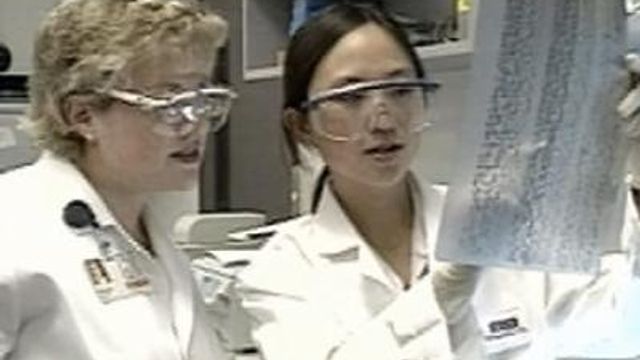Health Team
Genetic Testing Can Tell More About Risks Than Health-Care System Can Handle
testing can uncover hundreds of indicators of peoples' risks for diseases, but there aren't enough doctors and others qualified to help people take advantage of the developments.
Posted — UpdatedRALEIGH, N.C. — Genetic testing can identify more than a thousand genes that increase your risk for many chronic and often fatal diseases. Many people might go without the benefit of all that research, however, because some doctors and others in the health-care system aren’t prepared to apply it.
Selma Schimmel learned she had breast cancer when she was in her 20s, and she was able to benefit from genetic testing she had after that scare.
“For me, it was a real wake-up call,” she said. The testing revealed that she had the BRCA 1 gene mutation, which also placed her at greater risk for ovarian cancer.
That's what took her mother's life, so Schimmel had her ovaries removed.
“Much to my shock, when I awoke from surgery, I was told I already had ovarian cancer,” she said. Without testing and the surgery it caused her to choose, she might not have found out until much later.
Genetic testing can help identify risk for a wide range of disease in both children and adults. A recent review shows, however, that there are not enough genetic specialists to respond to the current needs of patients.
Some doctors don't know enough about genetic medicine to be able to refer patients for testing or counseling.
“The primary-care work force and other health professionals lack knowledge about basic genetic concepts, and they lack confidence in their ability to provide these services,” Dr. Maren T. Scheuner, a medical geneticist at the RAND Corp., said.
In a study published in the Journal of the American Medical Association, researchers looked at eight years of data about genetic medicine for adults.
They found many questions need to be answered before new genetic discoveries become part of clinical practice.
Among them, Scheuner said, are “who delivers it, how we train them and where it's delivered.”
Without the testing, Schimmel says she wouldn't have been as proactive.
“And I truly believe, as do my doctors, that that surgery saved my life,” she said.
In another note on genetic testing, scientists may have a new way to detect breast cancer earlier. It involves a simple hair test.
Now, scientists can use it to tell if a woman has the disease. They're still figuring out how to use the test as a tool for early risk-assessment.
• Credits
Copyright 2024 by Capitol Broadcasting Company. All rights reserved. This material may not be published, broadcast, rewritten or redistributed.





